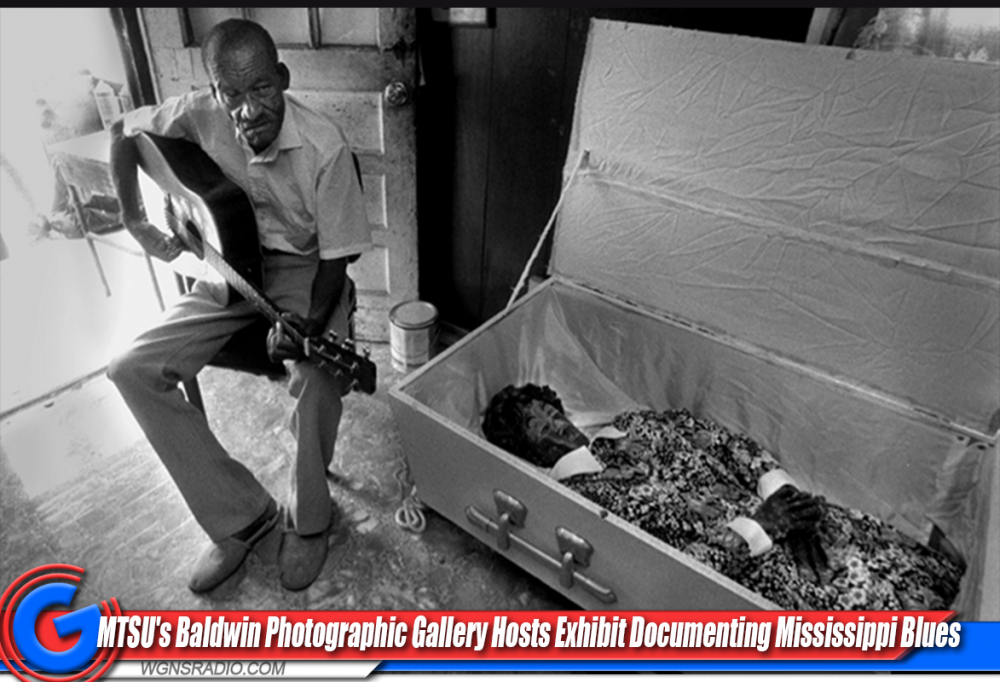MURFREESBORO, Tenn. — Photojournalist and Middle Tennessee State University alumnus Bill Steber takes a visual and interactive journey into the world of Delta blues with his newly installed exhibit on display through Dec. 9 at Baldwin Photographic Gallery on campus.
“Deep Roots: Evocations of the Mississippi Blues” features a collection of images, artifacts and mixed-media artwork from his 30-plus-year exploration and documentation of the Mississippi blues culture.
Musician Alvin Youngblood Hart and blues historian Scott Barretta will be on hand from 6-7 p.m. Wednesday, Oct. 4, in the Chris Young Café on campus to kick off the exhibit. At 6 p.m. Nov. 15, Steber will be on campus for an artist talk. Both events are free and open to the public. Gallery hours are 8:30 a.m. to 4:30 p.m. weekdays when MTSU classes are in session.
“What Bill does touches so many things — culture, history and music,” said Shannon Randol, MTSU assistant professor of photography and curator for Baldwin Gallery, located on the second floor of Bragg Media and Entertainment Building. “He’s devoted almost his entire life to photographing one geographic location.”
Steber’s love of blues music dates to his childhood, when he discovered his parents’ record collection of crossover musicians John Lee Hooker and Jimmy Reed.
“It was kind of transformative and I became a lifelong fan of traditional blues music,” said Steber, who picked up a camera about the same time he started tinkering with music.
Chance meeting, transformative experience - After graduating from MTSU, Steber was hired at The Tennessean in Nashville as a staff photographer. In 1992, he and a reporter went on assignment into the heart of the Mississippi Delta, where he met legendary musician and folk artist, Son Thomas.
“It was a day that I can mark my life as before and after,” Steber recalled.
In the front room of Thomas’ Leland, Mississippi, home was an “evocative” folk art sculpture of a woman’s body in a casket. Thomas performed for his guests and gave them an interview Steber will never forget.
“He was one of the most fascinating and genuine and inspiring human beings I’ve ever met, and I wanted to get as close to him and to the culture he represented,” Steber said.
But less than a year later, Thomas died from cancer.
“That set a fire under me to try to find as much of what was left of the culture that created blues in Mississippi, not just the musicians themselves, as quickly as possible,” Steber said.
Preserving roots of blues culture - The chance meeting was the genesis of his self-avowed obsession with blues and gospel culture deep in the Delta.
“I got really interested —not only in the musicians, the juke joints, the places where music happens — but the context of the people who still do traditional agriculture. … I started going to river baptisms. I started going to traditional services at tent revivals,” Steber said.
He also sought out practitioners of hoodoo, which is a combination of West African religious practices mixed with herbalism and spirituality of Indigenous peoples. And with that, he found other remnants of African culture still rooted in the Mississippi Delta.
“Once you learn a little bit and you learn little bit more, the world starts opening up,” Steber said. “There’s still so much more to find. I’m still exploring to this day.”
‘Authentic … and you can smell it’
In addition to the gallery images, you’ll find the façade of a bona-fide sharecropper shack that Steber preserved before it was demolished. Another corner of the room is an homage to Po Monkey’s juke joint in Merigold, Mississippi, including original signs and furniture from Willie “Po Monkey” Seaberry’s famous juke, as well as a scale model and images from the establishment.
The mixed-media piece, “You May Bury My Body,” pays homage to legendary blues musician Robert Johnson. In the center of a frame fashioned from salvaged wood is a trio of tintype images of a ploughed field where once stood the home where Johnson died in 1938 in Greenwood, Mississippi. There is a jar filled with dirt from the site and dead tree branches. Across the top is a reassembled deer skeleton.
“Everything here is authentic and you can smell it,” said Randol, referring to the earthen aroma of old wood and history.
Interactive media, including audio explanations of the images and artwork produced by Public Relations Storytelling class students of assistant professor Andrea Hall, can be found www.baldwinphotogallery.com and a QR code is available to use at the exhibit. You can also check out the Facebook page.
MTSU’s Baldwin Photographic Gallery, which is marking its 59th anniversary at MTSU in 2023, is part of the university’s College of Media and Entertainment. It’s located at the top of the stairwell in interior courtyard of the Bragg Building, 1735 Blue Raider Drive.
Off-campus visitors viewing the exhibit should obtain a special one-day permit from MTSU’s Office of Parking and Transportation at www.mtsu.edu/parking/. Free parking is available in the Rutherford Boulevard parking lots, with free Raider Xpress shuttle service running periodically to the interior of campus.
To learn more about the College of Media and Entertainment, visit https://mtsu.edu/media. See more of Steber’s work at www.steberphoto.com.





